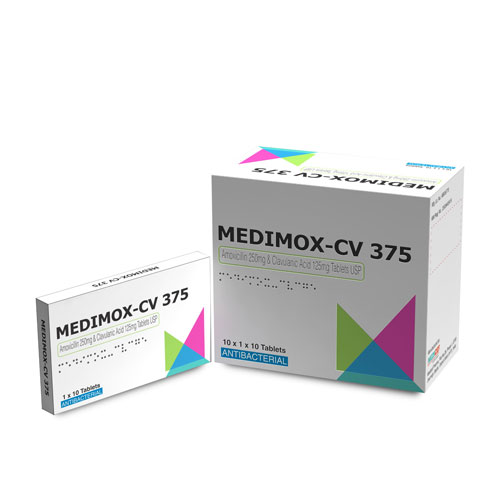
MEDIMOX – CV 375 Tablet
Therapeutic Class
Penicillins
Indications
Amoxicillin and Clavulanate Potassium tablets are indicated for the treatment of the following infections in adults and children Lower Respiratory Infections : Caused by B-lactamase-producing strains of H. influenzae and M. catarrhalis Upper Respiratory tract infection e.g., Otitis Media: Caused by B-lactamase-producing strains of H. influenzae and M. catarrhalis.
Chemical Composition
Each film - coated tablet contains.
Amoxicillin Trihydrate BP eq. to Amoxicillin 250 mg,
Diluted Potassium Clavulanate BP eq. to Clavulanic Acid 125 mg
Packaging
1 x 10's/ Box
Contraindications
In patients with a history of hypersensitivity to beta-lactams, e.g. penicillins and cephalosporins. Safety in pregnancy has not been established. There is limited information on the use of Amoxicillin and Clavulanate Potassium in human pregnancy. Use should be avoided in pregnancy unless considered essential by the physician. Amoxicillin and Clavulanate Potassium is contra-indicated in patients with a previous history of Amoxicillin and Clavulanate Potassium associated jaundice/hepatic dysfunction..
Warning & Precautions
Serious and occasionally fatal hypersensitivity ( Anaphylactic) reaction have been reported in patients on penicillin therapy. although anaphylaxis is more frequent following parenteral therapy, it has occurred in patients on oral penicillin. these reactions are more likely to occur in individuals with a history of Penicillin hypersensitivity, who have experienced severe reaction when treated with cephalosporins. before initiating therapy with any penicillin , careful inquiry should be made concerning previous hypersensitivity reactions to penicillins cephalosporins or other allergens. If an allergic reaction occurs, amoxicillin and clavulanate potassium should be discontinued and the appropriate therapy instituted: adrenaline, corticosteroids and antihistamines. MEDIMOX-CV should be avoided if infectious mononucleosis is suspected since the occurrence of a morbilliform rash has been associated with this condition following the use of amoxicillin. Transient hepatitis and cholestatic jaundice has been reported. MEDIMOX-CV should be used with caution patients with evidence of hepatic dysfunction. In patients with renal impairment, dosage should be adjusted according to the degree of impairment. MEDMOX-CV should not be used in patients with a glomerular filtration rate of less than 30 ml/minute. Prolonged use may occasionally result in overgrowth of non-susceptible organisms.
Drug Interaction
Concomitant use of probenecid is not recommended. Probenecid decreases the renal tubular secretion of amoxicillin. Its use may result in increased and prolonged blood levels of amoxicillin but does not delay renal excretion of the clavulanic acid. Concomitant use of allopurinol during treatment with amoxicillin can increase the likelihood of allergic Skin reactions. There are no data on the concomitant use of MEDIMOX-CV and allopurinol. As with other broad spectrum antibiotics, MEDIMOX-CV may affect the gut flora, leading to lower oestrogen reabsorption and reduced efficacy of combined oral contraceptives. In the literature there are cases of increased international normalized ration in patients maintained on acenocoumarol or warfarin and prescribed course of amoxicillin. If co-administration is necessary, the prothrombin time or international normalized ratio should be carefully monitored with the addition or withdrawal of MEDIMOX-CV.

